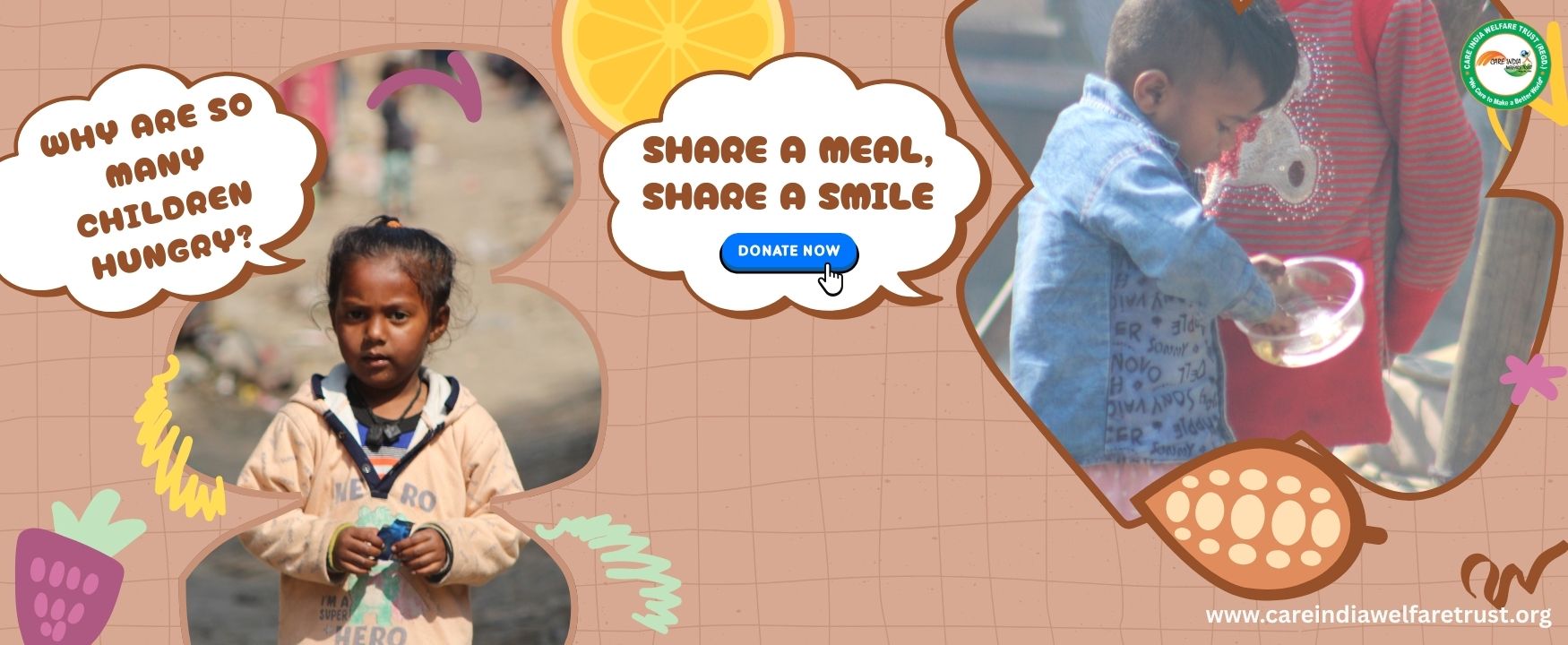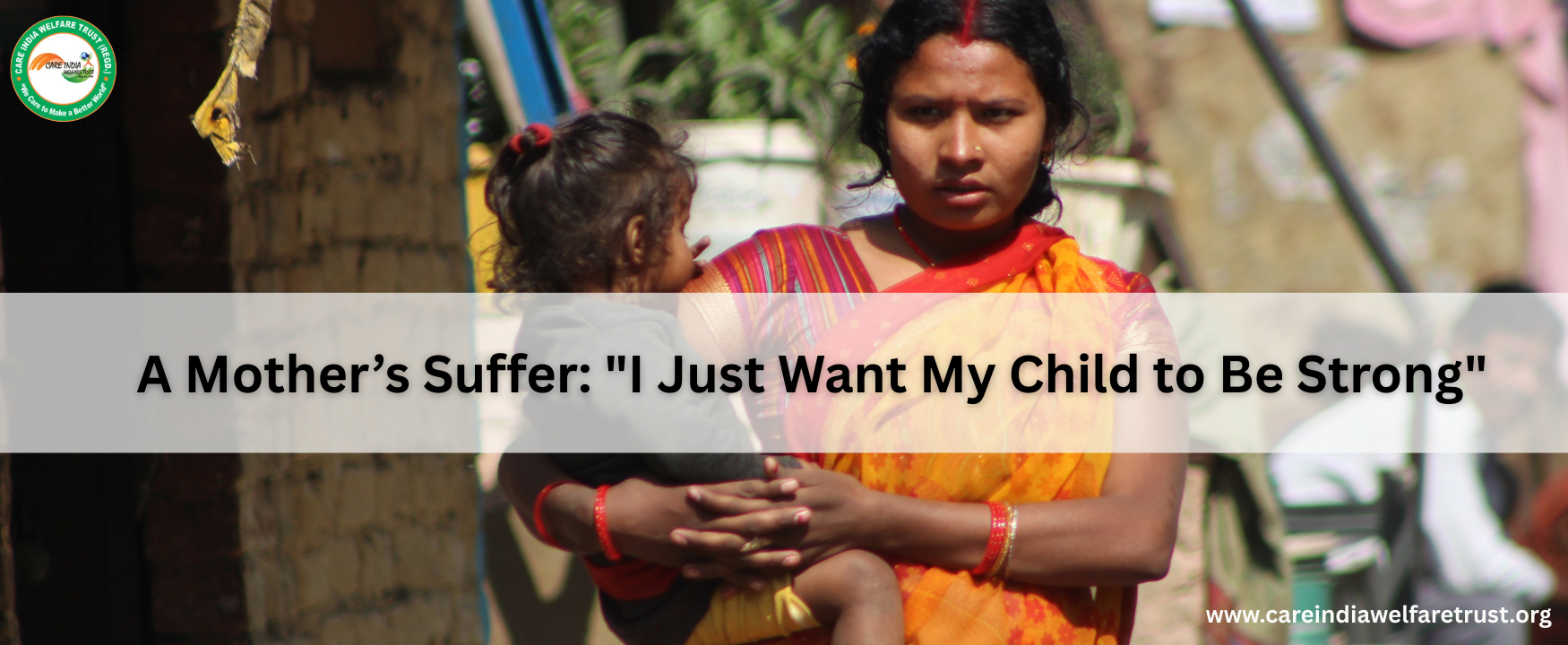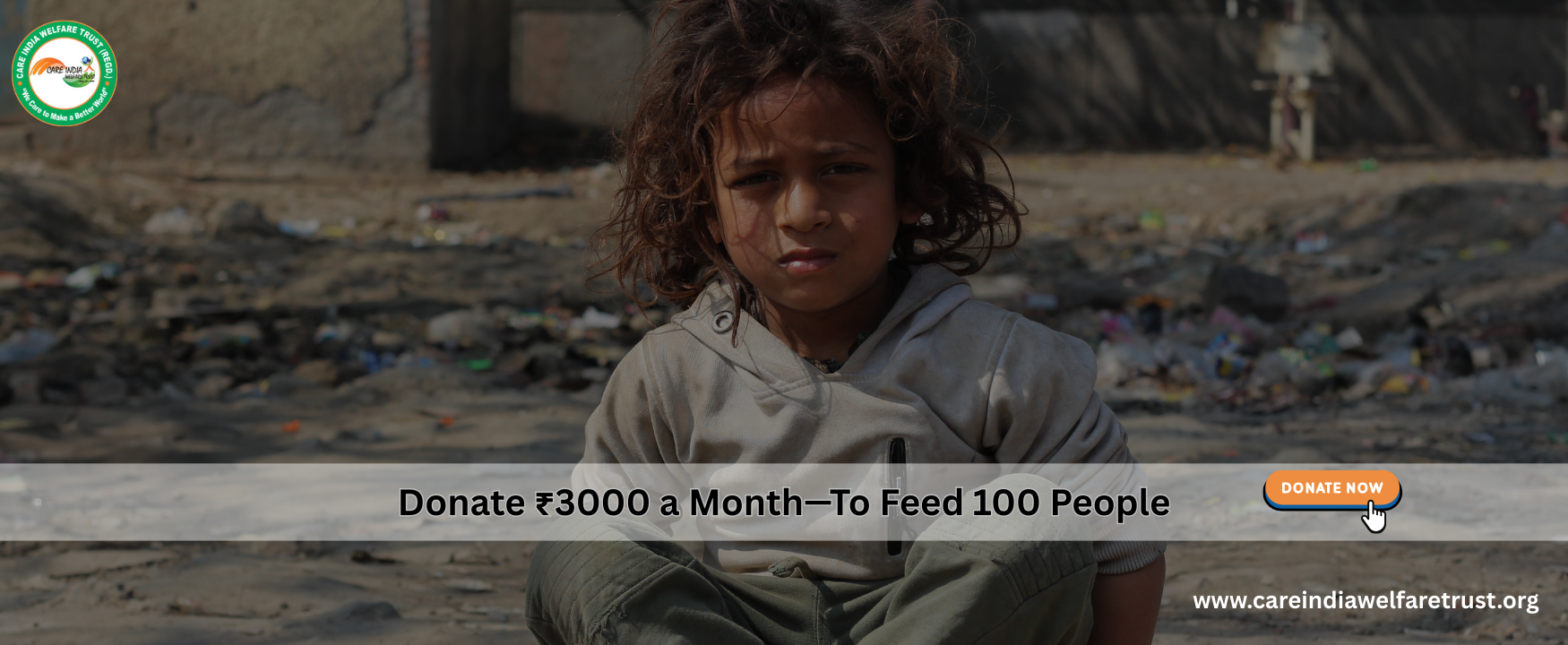In the shadows of India’s bustling cities and quiet villages, millions of children cry themselves to sleep not for toys or attention, but for a simple meal. Hunger is a silent thief, stealing their energy, health, and dreams before they even have a chance to chase them.
Hunger is not a few struggles for families trapped in poverty—it’s a daily battle. Parents skip meals so their children can eat, yet even then, the food is often just rice or roti with salt, lacking the nutrients needed for growth. Malnutrition doesn’t just weaken bones; it covers bright minds. A child who should be laughing, learning, and playing is instead too weak to concentrate in school and too tired to run with friends.
India produces enough food to feed its people, yet distribution gaps, unemployment, and inflation leave plates empty. Government programs exist, but many families remain unaware or unable to access them. The result? A generation growing up stunted, physically and mentally.
This isn’t just about food—it’s about lost potential. A hungry child today could have been a doctor, an artist, or a leader tomorrow. But without nourishment, their dreams starve before they can even take root.
We must see their hollow eyes, hear their silent pleas, and act—because no child should ever know the pain of an empty stomach.
The Silent Cry of Empty Stomachs
Every night, as the stars blink over India’s vast landscapes, millions of children curl up on thin mats, their tiny stomachs growling in emptiness. They don’t cry—not anymore. Hunger has taught them silence. For them, hunger isn’t just missing a meal; it’s missing a childhood.
Imagine a little girl named Priya, just six years old, her ribs visible under her faded dress. She tries to focus in school, but her mind drifts—not to daydreams, but to the gnawing pain in her belly. Her mother, Sunita, works as a housemaid, earning barely enough for rent, let alone nutritious food. Some nights, Sunita skips dinner so Priya can have an extra roti.
This is not just Priya’s story. It’s the story of 8.5 million children in India who suffer from severe malnutrition. It’s the story of parents who must choose between feeding their child and buying medicine. It’s a crisis that steals futures before they even begin.
Why Are So Many Children Hungry?
Hunger among children in India is not just a lack of food—it’s a crisis woven from poverty, inequality, and broken systems.
1. Poverty Traps Families in Hunger
Millions of parents earn less than ₹200 a day, forcing impossible choices—buy food or pay rent? Send a child to school or send them to work? Many survive on one meager meal, leaving kids malnourished and weak.
2. Food Doesn’t Reach Those Who Need It
India produces enough food, but corruption, waste, and poor distribution mean supplies rot in warehouses while children starve. Government schemes exist, but red tape and lack of awareness keep help from reaching slums and remote villages.
3. Malnutrition Starts Before Birth
Pregnant mothers in poverty often go hungry, leading to underweight babies. Children suffer stunted growth and lifelong learning difficulties without proper nutrition in their first two years.
4. Climate & Crisis Deepen Hunger
Droughts, floods, and rising food prices hit the poorest hardest. A bad harvest or a parent’s illness can push a family from struggle to starvation.
5. The Cycle Never Ends
Malnourished children grow into weaker adults, earning less and perpetuating the hunger trap. But there’s hope.
Solutions exist:
- Expanding school meal programs
- Direct food aid to mothers and infants
- Teaching families affordable nutrition
- Holding systems accountable
Hunger isn’t inevitable—it’s a problem we can solve. Every child deserves a full plate and a future.
A Mother’s Suffer: "I Just Want My Child to Be Strong"
In the heart of India’s crowded slums and remote villages, countless mothers whisper a painful prayer each night: “I just want my child to be strong.” These simple words carry a depth of agony, love, and desperation that many of us may never truly understand. For mothers in poverty-stricken areas, strength is not just physical—it’s the strength to fight illness, to stay in school, to laugh, to play, and to dream without hunger gnawing at the belly.
These mothers watch their children suffer from weakness, dizziness, or constant fatigue—symptoms of chronic malnutrition. They skip meals so their children can eat. They feel helpless when their child cannot concentrate in school or falls sick again and again. Medical help is often too far or too expensive, and even basic food becomes a luxury. The emotional toll is crushing. A mother’s instinct is to nurture, but poverty robs her of the tools to do so.
Yet, even in despair, these mothers remain resilient. Their love drives them to seek help, accept education, and fight for a better future. Programs that provide nutritious meals, prenatal care, and awareness about healthy eating are life-changing. Empowering these mothers means empowering entire generations.
When a mother says, “I just want my child to be strong,” she’s not asking for luxury—she’s asking for a chance. A chance to see her child stand tall, live well, and chase dreams. It’s a plea we must listen to—and act upon with urgency and compassion.
The Power of One Meal
Imagine a single plate of khichdi, steaming rice and vegetables, placed in front of a hungry child. For a child in a Delhi slum, this meal isn’t just food; it’s the difference between a growling stomach and a day of learning. Before joining Care India Welfare Trust’s meal program, these children often skipped school to scavenge for scraps. Today, she sits in class with energy, her notebook filled with scribbled dreams of becoming a doctor.
One meal does more than fill a belly—it ignites potential. Nutrient-rich meals boost immunity, sharpen focus, and restore hope. For millions of children in India, that plate is a lifeline. Consider this:
- A child who eats regularly is 75% more likely to stay in school.
- Just ₹30 provides a balanced meal with vegetables and grains.
- Daily meals reduce stunting by 30% in vulnerable communities.
At Care India Welfare Trust, we’ve seen firsthand how one meal can rewrite futures. Our community kitchens and school programs ensure no child learns on an empty stomach. Malnourished and withdrawn, they struggled to keep up in class. After six months of daily meals, their teacher says, “He’s the first to raise his hand now.”
But hunger is relentless. Every day, 35,000 children in India risk slipping into severe malnutrition. That’s why your support matters. ₹3000 feeds 100 peoples for a month—a small act with ripple effects. Full stomachs become educated minds, healthy bodies, and hopeful hearts.
Your plate of compassion can save a life. Donate today at careindiawelfaretrust.org, and join us in proving that one meal holds the power to nourish a future.
The Heroes Fighting Hunger
In the shadows of bustling cities and quiet villages, unseen by the world, a group of heroes rises every day—not with capes or grand speeches, but with food packets, kind words, and unshakable commitment. These are the people who choose to fight hunger head-on, working tirelessly to ensure no child goes to sleep on an empty stomach.
They walk through narrow alleys, knock on broken doors, and sit beside tearful mothers to listen, understand, and offer hope. Sometimes, it’s a warm meal for a hungry child. Sometimes, it’s ration kits for a struggling family. But always, it’s a lifeline.
These heroes aren’t driven by fame or reward. They work in harsh weather, through floods, heat, and lockdowns. Their reward? A child’s smile after a full meal. A mother’s tears of relief. The spark of strength returning to weak limbs.
They organize food drives, distribute dry groceries, teach families how to grow vegetables in small spaces, and ensure children get access to midday meals. Their vehicles are often bicycles or their own feet. Their tools—compassion and persistence.
They don’t always wear uniforms. Some are students, others shopkeepers, teachers, or volunteers from NGOs. But their mission is united: to ensure hunger doesn’t steal childhood, dignity, or life.
Every grain they deliver, every child they nourish, adds up to a quieter kind of revolution. Because in a world full of noise, these everyday warriors speak the language of action—and change the story, one meal at a time.
How Hunger Steals Futures
Malnutrition isn’t just about hunger today—it robs tomorrow.
- Stunted growth affects brain development.
- Weak bodies mean more illnesses.
- No education leads to lifelong poverty.
A hungry child today becomes a struggling adult tomorrow.
You might scroll past heartbreaking headlines, thinking, “What can I do? I’m just one person.” But here’s the truth: one person can spark a revolution of hope.
Imagine a little girl in a slum, her tiny hands trembling as she eats her first proper meal in days. That meal came from someone like you—someone who chose to act instead of scroll past.
Donate ₹3000 a Month—To Feed 100 Hungry People
₹3000 isn’t just a number—it’s 100 warm, nutritious meals of dal, rice, and vegetables. For a child in a forgotten village or a busy urban slum, it means 10 days without hunger, 10 days of focused learning at school, and 10 steps closer to a healthier, happier life.
One mother recently whispered through tears, “My son stopped crying at night. Now, he laughs and plays.”
Volunteer—Serve Meals, Share Smiles
Give a few hours on a weekend. Help cook, pack, or serve meals. Or simply sit with the children and listen to their dreams. One young volunteer shared, “I went to help, but they ended up healing me. Their gratitude stays with you.”
Spread Awareness—Break the Silence
Hunger thrives in silence. Share this message on WhatsApp, repost our stories, or talk about it at dinner. One simple share inspired a group of friends to raise enough to feed 50 children for a month.
You might scroll past heartbreaking headlines, thinking, “What can I do? I’m just one person.” But here’s the truth: one person can spark a revolution of hope.
Imagine a little girl in a slum, her tiny hands trembling as she eats her first proper meal in days. That meal came from someone like you—someone who chose to act instead of scroll past.
Donate ₹3000 a Month—To Feed 100 People
With just ₹3000 a month, you can feed 100 hungry people. That’s not just food—it’s pride, energy, and hope. Children, the elderly, and workers in need gain strength, sleep, and smiles. Small acts create a big impact. Your donation rewrites stories of hunger into stories of survival. Be the reason they hope.
One mother recently whispered through tears, “My son stopped crying at night. Now, he laughs and plays.”
Volunteer—Serve Meals, Share Smiles
Give a few hours on a weekend. Help cook, pack, or serve meals. Or simply sit with the children and listen to their dreams. One young volunteer shared, “I went to help, but they ended up healing me. Their gratitude stays with you.”
Spread Awareness—Break the Silence
Hunger thrives in silence. Share this message on WhatsApp, repost our stories, or talk about it at dinner. One simple share inspired a group of friends to raise enough to feed 50 children for a month.
Your voice can be the spark. Your action, the change. Your voice can be the spark. Your action, the change.
Still unsure?
Think of it this way: If 100 people donate ₹3000, we feed 3,000 meals. If 1,000 share our mission, we kindle a movement. You’re not “just one person”—you’re a lifeline.
Take the first step today:
- Donate at careindiawelfaretrust.org/donate.
- Tag 3 friends on social media with #FeedTheFuture.
- Forward this to someone who cares.
Together, we’re not just feeding stomachs—we’re nourishing dreams. Be the change a child is praying for.
A Story of Hope: Second Chance
In the narrow lanes of an overcrowded slum, a young boy once sat quietly beside a pile of discarded books, watching other children hurry past to school. His eyes weren’t sad—they were tired. Tired of hoping, tired of empty stomachs and missed opportunities. His parents wanted the best for him, but daily survival left little room for dreams.
That boy could have slipped through the cracks of society, forgotten by a world that moves too fast. But something changed. One day, a volunteer visited his neighborhood with warm meals and even warmer words: “You deserve a chance.” It wasn’t much—a plate of food, a kind gesture, and the promise of education—but it was enough.
With a full stomach and a renewed sense of purpose, the boy began attending school. His hunger for learning grew stronger than the hunger he once knew. With every book he read and every class he attended, his future started to take shape.
Today, he walks to school not as an outsider, but as a student filled with confidence. His laughter echoes through the same streets that once held his silence. He’s not just learning; he’s living.
This is the power of a second chance. It doesn’t require miracles—just compassion, commitment, and the belief that every child, no matter where they’re born, deserves to dream.
Because when we give children a second chance, we don’t just change one life—we change the future.
Would you like similar 250-word stories under different emotional themes like courage, gratitude, or transformation?
Your support writes these second chances.
- ₹1,000 funds a child’s meals and health check-ups for a month.
- ₹5,000 sponsors a village nutrition workshop.
A Nation’s Promise: No Child Left Behind
India’s greatness isn’t in its cities or economy—it’s in its children.
If we want a stronger India, we must start with stronger children.
This Is Our Pledge:
- No child should sleep hungry.
- No mother should cry over an empty pot.
- No dream should starve.
The Last Roti
There’s an old saying in Hindi: "Bhookh insaan ka sabse bada dushman hai." (Hunger is man’s greatest enemy.
Every meal you help provide isn’t just food—it’s hope, dignity, and a future.
Will You Join the Fight?
Because somewhere, right now, a child is waiting.
And you can be the reason they eat tonight.




